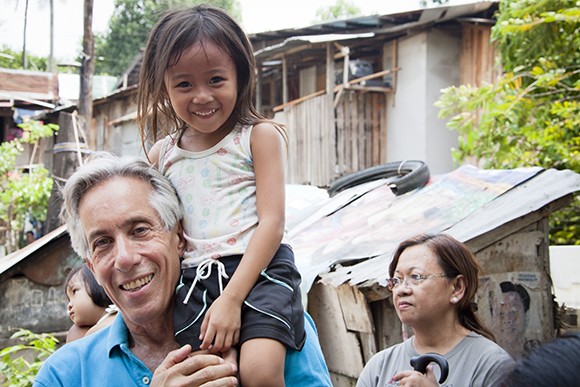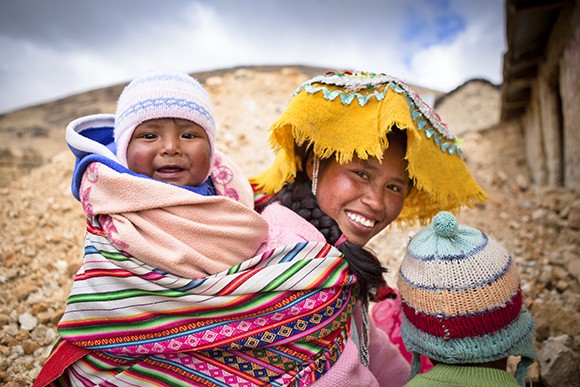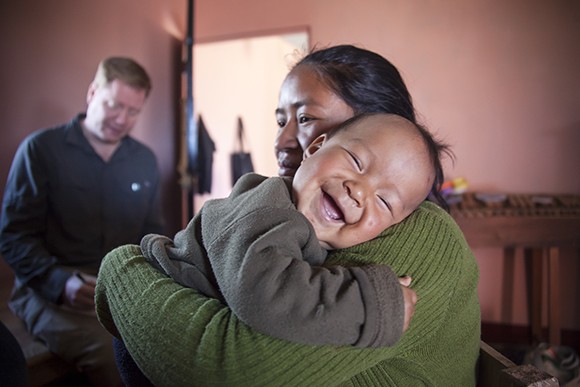A dose of kindness: Vitamin Angels celebrates 20 years
IN THIS ARTICLE
- Nonprofits Topic
- Erika Martin Author
By Erika Martin Friday, April 18th, 2014

Vitamin Angels founder Howard Schiffer, pictured here in the Philippines, was a natural-products entrepreneur before he entered the nonprofit world. Vitamin Angels distributes vitamins and nutrients to impoverished communities around the world. It recently teamed with the Bill and Melinda Gates Foundation. (photo courtesy of Matt Dayka/Vitamin Angels)
The 1994 Northridge Earthquake turned Howard Schiffer’s priorities upside-down.
After spending years as an entrepreneur in the natural products industry, the earthquake’s aftermath, particularly among marginalized communities, left Schiffer feeling helpless. He was also forced to confront the broader impacts his merchandise could have on public health.
Using his business connections to secure product donations, Schiffer founded Santa Barbara-based nonprofit Vitamin Angels. The group will celebrate its 20th anniversary this year by distributing vital Vitamin A capsules to 40 million children across 45 countries, including the United States. To cap off that milestone, it recently announced a partnership with the Bill and Melinda Gates Foundation to combat intestinal worm infections in developing countries.
Before launching his career as an entrepreneur, Schiffer worked as a midwife and saw first-hand the impact good nutrition can have on childhood development. Vitamin Angels puts that initial experience to work distributing nutritional products similar to what he sold as an entrepreneur.
Before the earthquake hit, boredom had begun to set in, Schiffer recalled. “I just got to a point where I thought if I had to look for what the next top product was or what the next trend was I was going to go mad,” Schiffer said. “I started thinking, ‘Why not start doing something that I believe in?’ ”
He called a friend who worked in vitamins. When that first shipment of Vitamin A arrived, Schiffer was blown away by relief workers’ response. “They were overjoyed and told me high-dose Vitamin A will prevent children from going blind. I had been in vitamins for 14 years and…I never heard of that. I almost fell off my chair,” Schiffer said during an extended interview at Vitamin Angels’ downtown Santa Barbara offices.
Before implementing any programs, Schiffer teamed up with doctors at Johns Hopkins University to research how to create the biggest impact. The results showed that nutrient intervention for children under 5 years old was the most cost-effective public health initiative possible, providing more bang per buck than even malaria treatment and immunization.
He also learned that vitamins are critically needed, but often unavailable. At the time the largest organizations, including even UNICEF with its global reach, didn’t have access to Vitamin A and other crucial health supplements; two does per year of Vitamin A at a cost of 25 cents per dose can reduce blindness and even death in undernourished children.
Although his connections took care of the supply side of the equation, Schiffer needed to find distribution infrastructure. He negotiated a partnership with Goleta-based nonprofit Direct Relief to piggy-back his vitamins onto their shipments. Since the product was still being donated, this meant Vitamin Angels could put its energy into making sure it delivered the biggest impact possible.
“Our cost of goods was zero and our distribution costs were zero, so all we had to do was administer the program,” he recalled. “We just had to team up the people with the greatest resources, with those with the fewest resources.”
In its first year, the agency distributed 100,000 vitamins. By 2008, it reached 2.5 million children worldwide, ballooning to a footprint of 8 million children the next year. Last year, it expanded to 30 million children.
And Schiffer has no plans of slowing down. Earlier this month, Vitamin Angels announced its involvement in an initiative facilitated by the Bill and Melinda Gates Foundation to control intestinal worm infections.
The nonprofit has committed $4.5 million to scale up co-administration of albendazole, a deworming treatment, with its vitamin A distribution. The initiative’s other founding partners include humanitarian heavyweights such as the World Food Programme and World Bank.

A Peruvian mother and her children in one of the communities that Santa Barbara-based nonprofit Vitamin Angels, which distributes nutrients, works with. (photo courtesy of Matt Dayka/Vitamin Angels)
“Because we’re visible, because we’ve become experts in this one area that’s very critical, big organizations, such as the Gates Foundation and UNICEF, are now asking us to help them do the training,” Schiffer said.
The group’s rapid growth rate is largely due to the use of indigenous, on-the-ground organizations to deliver the supplements to villages in need. The groups are responsible for meeting the product at its port of entry, shipping it to a warehouse that meets Vitamin Angel’s standards and distributing it to the community according to international best practices.
“We went to the people who were doing the work anyhow. They know the nutrients are needed, they’re already set up with an infrastructure, they already have some kind of funding to keep them going, and we’ll just provide this resource and technical know-how,” Schiffer said. “If they ask us for money, we just say, ‘That’s not the game we’re playing.’ It’s kept the work really clean.”
This inverted the top-down structure other large relief groups have been employing for years, which largely relies on government infrastructure, with results often diminishing with each layer of red tape.
“Most other organizations deal with the low-hanging fruit. It’s easier to go to the government, it’s easier to go to a primary health care system that’s already set up, it’s easy to go into urban areas,” Schiffer said.
He designed a program inspired by rock star Bono’s Product Red marketing campaign to benefit AIDs, which requires companies to incorporate the organization into their business rather than just signing a check and continuing with business as usual. Vitamin Angels targeted companies that sold supplements or worked in maternal and infant health with a cause-related marketing model. “Vitamins Angels is a terrific platform to tell your customers that not only do you want them to be healthy, but you want the world to be a healthier place, and that has been a really appealing message,” he said.

Vitamin Angels also works with communities in Guatemala. (photo courtesy of Matt Dayka/Vitamin Angels)










